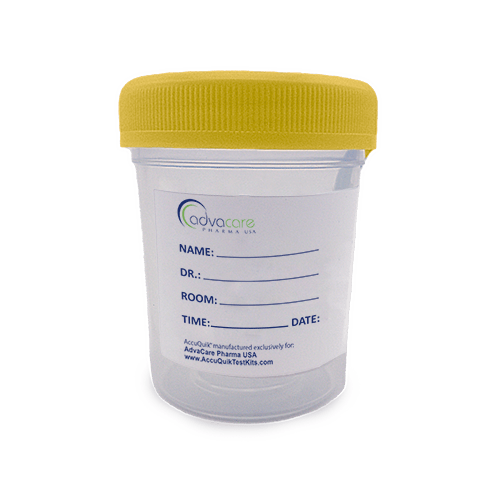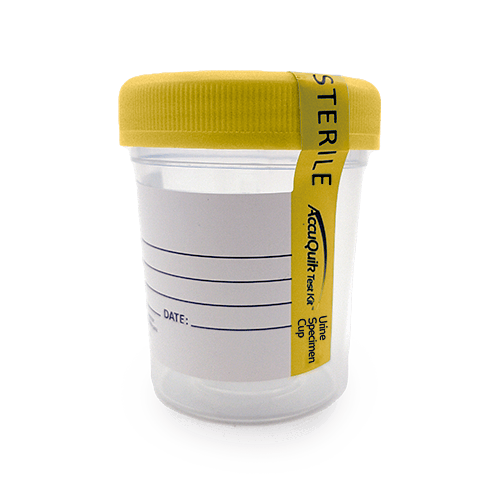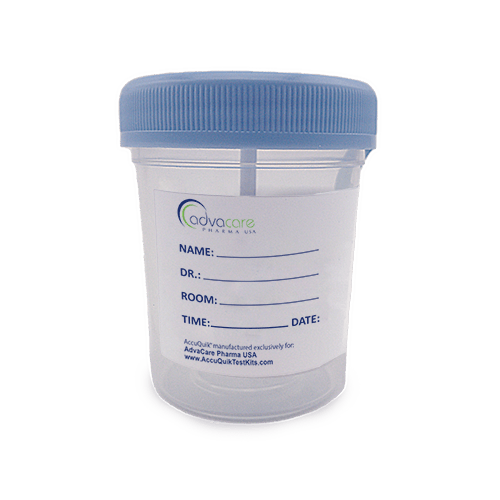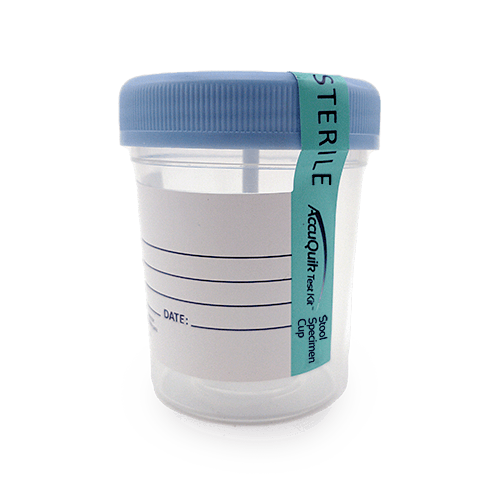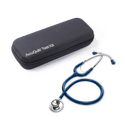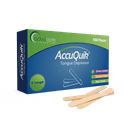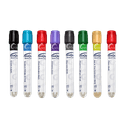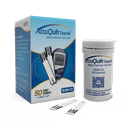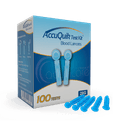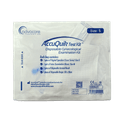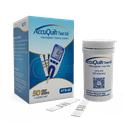Specimen Cup
Type
Label
Sterility
Size
Cap Color
Packaging
What is a Specimen Cup?
A Specimen Cup is a container that has been specially designed for collecting and storing biological specimens for laboratory testing and analysis. Collection cups are often used in medical, diagnostic, and research settings, and they provide patients or individuals with a leak-proof container to collect samples.
This type of cup is also called a urine collection cup or stool collection cup, depending on its design.
AdvaCare Pharma manufactures Specimen Cups in ISO and CE-certified facilities located in India, China, and the USA. Every production factory undergoes routine inspections to ensure strict compliance with healthcare standards and the highest levels of quality and safety.
Product Specifications
Features
Specimen Cups can be used to collect and store various types of biological materials, including urine specimens, stool specimens, sputum specimens, and histology samples.
Specimen collection cups are available in 4 sizes and volume capacities for the different specimen collection requirements. These cups feature color-coded caps and are available with or without a security tab label. The stool specimen cup is equipped with a screw top and a built-in scoop for easy sample collection.
Why are we a leading Specimen Cup manufacturer?
AdvaCare Pharma is a reputable and leading manufacturer of Specimen Cups. Our company offers an extensive range of over 4,000 globally recognized pharmaceuticals, medical devices, supplements, and veterinary products. To ensure the quality of the AccuQuik™ diagnostic detection devices, we adhere to stringent CE and ISO regulations at our production facilities.
AdvaCare Pharma's approach to supply chain management is systematic and data-driven. This helps optimize our resources, which delivers greater value to our clients and end-users. Our worldwide partners include hospitals, pharmacies, distributors, NGOs, and government institutions.
Uses
What is a Specimen Cup used for?
Specimen Cups are used in medical settings for the collection, transportation, and storage of various biological samples for diagnostic purposes. These cups are designed to securely contain bodily fluids, such as urine or stool, as well as other types of specimens, including sputum or tissue samples. Healthcare professionals utilize Specimen Cups to collect samples from patients during routine medical examinations, diagnostic tests, or therapeutic procedures.
The collected specimens are then transported to laboratories or testing facilities for further analysis, where they aid in diagnosing medical conditions, monitoring treatment efficacy, and conducting research studies.
Specimen Cups offer a hygienic and convenient means of sample collection, guaranteeing the preservation of sample integrity and minimizing the risk of contamination or leakage during transportation and storage.
What are the different types of Specimen Cups available?
Specimen Cups come in various types, each designed for specific sample collection needs and requirements. The two primary types of Specimen Cups are urine specimen cups and stool specimen cups. Urine specimen cups are specifically designed for collecting urine samples for diagnostic testing such as urinalysis or urine culture.
These cups often feature a wide mouth and secure lid to prevent leakage and contamination during sample collection and transportation. Stool specimen cups, on the other hand, are intended for the collection of stool samples, primarily for laboratory analysis to detect gastrointestinal infections, parasites, or other abnormalities. Stool specimen cups may include features such as built-in scoops or spatulas for easier sample collection and handling.
Specimen Cups may vary in terms of sterility, with options available for sterile and non-sterile cups depending on the intended use and sample collection requirements.
What are the benefits of using Specimen Cups in healthcare settings?
The use of Specimen Cups offers several benefits in healthcare settings, contributing to elevated patient care, diagnostic accuracy, and infection control:
- Specimen Cups provide a hygienic and convenient means of collecting biological samples, reducing the risk of contamination and aiding the integrity of specimens for accurate testing.
- Securely containing samples, Specimen Cups then help prevent spillage or leakage during transportation, minimizing the potential for exposure to hazardous materials and biohazards.
- Specimen Cups help with standardized sample collection procedures, allowing staff to obtain consistent and reliable samples across different patients and clinical settings. This standardization increases the accuracy and reproducibility of diagnostic tests, leading to more reliable clinical results and informed medical decision-making.
- These cups encourage infection control measures by establishing proper handling and disposal of potentially infectious materials, thereby reducing the risk of healthcare-associated infections and protecting healthcare workers and patients.
What are the main features of Specimen Cups?
Specimen Cups are equipped with various features designed to simplify efficient and safe sample collection, storage, and transportation in medical environments:
- One main feature of Specimen Cups is their volume capacity, which can vary to accommodate different sample sizes and testing requirements.
- Specimen Cups are available in multiple sizes, ranging from 30ml to 120ml, assisting healthcare staff to collect adequate sample volumes for various diagnostic tests and analyses.
- Specimen Cups may feature color-coded caps or labels for easy identification and organization of samples, particularly in busy clinical settings where multiple specimens are collected simultaneously.
- Some Specimen Cups also include security tab labels, which supply tamper-evident seals to protect sample integrity and prevent unauthorized access or contamination.
- They may be available in sterile and non-sterile options, depending on the specific application and need for sample sterility. Sterile Specimen Cups are individually packaged and sealed to conserve sterility until use, making them suitable for sensitive diagnostic tests requiring uncontaminated samples.
How are Specimen Cups used for diagnostic testing?
Patients are instructed to collect the required sample, such as urine or stool, directly into the Specimen Cup, checking that the specimen is uncontaminated and properly labeled with patient identification information. Once the sample is collected, the Specimen Cup is securely sealed to prevent leakage and contamination during transportation to the laboratory.
In the laboratory, trained technicians process the specimens according to established protocols and perform diagnostic tests to detect pathogens, abnormalities, or other relevant biomarkers. Specimen Cups expedite the efficient handling and processing of samples, enabling timely and accurate diagnostic results to inform patient care decisions.
Specimen Cups may be used for specimen storage, permitting residual samples to be retained for further testing or archiving purposes, if needed.
How should Specimen Cup be disposed of after use?
The disposal process usually adheres to stringent guidelines established by local regulatory authorities for medical waste management.
Healthcare centers often employ specific protocols for the disposal of medical waste, including Specimen Cups. These protocols may involve placing the used cups in designated biohazard containers or bags, specially designed to prevent leakage and contamination. Once filled, these containers are securely sealed to prevent any potential exposure to hazardous materials.
Healthcare personnel responsible for handling medical waste must receive adequate training on disposal procedures to mitigate the risk of infection transmission and environmental contamination.
What are the storage recommendations for Specimen Cups?
Adequate storage of Specimen Cups is mandatory to preserve the integrity of collected biological samples and obtain accurate test results. Specimen Cups should be stored in a controlled environment that minimizes the risk of contamination and degradation of specimens. Ideally, storage facilities should maintain stable temperature and humidity levels to prevent any adverse effects on the samples.
Specimen Cups should be kept in clean, dry areas away from direct sunlight, heat sources, and potential contaminants. Store the cups in designated cabinets or storage units specifically allocated for medical supplies to prevent cross-contamination.
Specimen Cups should be organized and labeled according to their contents and collection dates to clear the way for easy identification and retrieval when needed for analysis or testing. Regular inventory checks and rotation of stock can help guarantee that Specimen Cups are used within their designated shelf life and preserve sample integrity.
FAQs
Can the Specimen Cup be used for different types of samples?
The specimen cups can be used for various types of samples, including stool, sputum, and urine.
Should a sterile or non-sterile collection cup be used?
Sterile specimen cups are often used for situations where maintaining a sterile environment is crucial, such as collecting samples for microbiological testing or cultures. These collection cups have been individually packaged and sealed to ensure sterility until use. Non-sterile specimen cups may be used when sterility is not necessary, such as collecting non-infectious samples or for general storage purposes.
What is the recommended use of each size of Specimen Cup?
It is important to consider the specific requirements of the test or analysis being performed. Generally, the 30ml collection cup is commonly used for collecting urine samples during a routine urine test or for basic diagnostic purposes. The 60ml size is more often recommended for urine collection when a larger sample volume is needed, including for more extensive laboratory testing or when multiple tests are necessary. The 90ml specimen cup is ideal for various types of samples, including urine and stool. The larger volume capacity is suitable for comprehensive laboratory analysis or when repeat testing may be necessary. The 120ml specimen cup is ideal for special circumstances that require a higher volume of sample for analysis, including some types of research studies or diagnostic tests.
Can the packaging of your Specimen Cups be adjusted to fit the needs of my market?
Our standardized packaging can be modified to align with regulatory requirements and some market preferences. However, certain medical device packaging options may have limitations to ensure product integrity remains intact.
Can I import Class I medical devices for distribution in my country?
Yes, Class I medical devices are generally subject to less stringent regulatory requirements, making them easier to register, import and distribute in foreign countries. However, every country has specific distribution regulations that every local distributor must abide by. While we support our distributors through the product registration process, it is the responsibility of the distributor to ensure local compliance.
References
Specimen Labelling Procedure
The article discusses the significance of proper specimen labelling in medical research. It emphasizes that all request forms must clearly describe each specimen, including type and site, to ensure accurate identification and tracking during testing.
Importance of Specimen Cup Quality for Medical Tests
This study focuses on the importance of specimen cup quality in medical testing. It highlights real-life case studies demonstrating the consequences of using low-quality cups, leading to inaccurate test results. It also mentions innovations in specimen cup design to enhance functionality and safety, such as leak-proof caps and tamper-evident seals.

You might be interested in...
Why AdvaCare Pharma?
As an industry leader, we are aware of our responsibility to provide affordable and sustainable solutions to improve healthcare worldwide.
